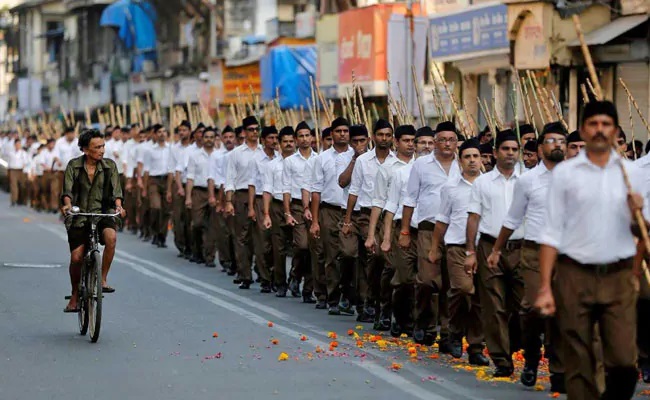DND Report
After facing a historic defeat at the hand of Pakistan and global isolation due to one-decade extremist rule of radical Hindus, the Rashtriya Swayamsevak Sangh (RSS) is selling a new version of the party that is tolerant, all-inclusive, respecting international borders and putting the concept of Akhand Bharat at back burner.
In October RSS will be 100-year-old that had enjoyed governance several times in last 40 years under the banner of BJP and tried best to achieve the goal of a “puritan India”. Now reality check of global isolation and dust licking defeat by the hand of archrival Pakistan, RSS is trying to change the persona and its chief, Mohan Bhagwat, is attempting to modernize its image while retaining its core ideology. In a three-day lecture series in Delhi, he drew the Sangh’s guiding principles: individual character formation, societal change, and the belief that “Hindustan is a Hindu Rashtra.” He tried to sell the concept that RSS’s proximity to state power through the BJP is just a proximity and cooperation therefore the failures of BJP should not be portrayed the failure of the philosophy of RSS. He addressed an audience of around 1,000 people for three days in Vigyan Bhawan in Delhi, on August 26, 27, and 28 and explained the new version of RSS.
Interestingly during his lectures, he promoted the idea of harmony among all Hindus and rejected discriminatory elements based on the teachings of Manusmrat. On religion, Bhagwat acknowledged Islam and Christianity as permanent parts of India, urging Muslims and Christians to embrace a shared cultural ancestry while limiting Hindu claims over Muslim places of worship to Ayodhya, Kashi, and Mathura. He cautioned Hindus against aggressive temple–mosque disputes, saying unity requires trust and mutual respect. He claimed that Akhand Bharat (undivided India) is a cultural concept, while accepting the reality of current international borders. His remarks reflect a that RSS leadership now understands that it is losing the popularity and it needs balancing acts such as preserving RSS’s ideological foundations while appealing to wider audiences, addressing caste and communal divides, and managing its relationship with state power under the BJP but not ready to take the burden of failures of Modi government.

The central challenge for Bhagwat in the RSS’s centenary year is not winning over critics, but steering his supporters away from hardline positions on caste and religion, and toward a more inclusive vision of Hindu unity.
Bhagwat, its sixth chief of RSS and is turning 75 on September 11, 2025. He is meeting diplomats, professionals from various fields, and journalists. The RSS is walking a tightrope between flexibility and permanence on a range of issues and Bhagwat wants to get more people to follow the Sangh’s views, without losing those who are already in the camp.
The moral claims of the RSS — discipline, sacrifice, incorruptibility were easier to make when it was distant from power. But the last decade of near absolute control of state power across the country has expanded its influence but also weakened its claim of aloofness. By endorsing Prime Minister Narendra Modi’s complete authority over government, Bhagwat sought to dispel suggestions of discord between the Bharatiya Janata Party (BJP) and the RSS, and also underscored a degree of separation between the two.
